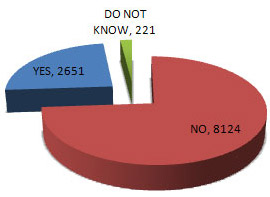You are here
- Afghanistan is bigger criminal than India: Ausaf
- Raise Junagadh issue in UN, include Nawab in country’s political system: Nawa-e- Waqt
- Pakistan wants better relations with US but not on the cost of its sovereignty: Agha Masood
- Pakistan Pulse; Opinion Poll by Asas Urdu daily
Ausaf, Editorial, January 14, 2010
Afghanistan is bigger criminal than India: Ausaf
The Director General of the Inter Services Intelligence (ISI) in a briefing to Parliament’s Special Committee on National Security has said that terrorist activities are being executed on Pakistani territory via Afghanistan, writes Ausaf Urdu daily. Commenting on the issue, the daily says that “this has been the case for a long time; that Afghan soil is being used against Pakistan but the confirmation from DG ISI makes the doubt clear that Kabul is inflicting more wounds on Pakistan than the Delhi.” Pakistan says that RAW agents have unleashed a strategy to destabilize Pakistan. Indian consulates have been working against Pakistan, money is being distributed and weapons are being supplied and we have been criticizing India in our writings, says the daily. The editorial in this context notes that “the fact is that Afghanistan is a bigger criminal by allowing its soil to be used by India and thus a partner in the crime against Pakistan.” It is strange that we never dared to question America despite being its ally that on the one hand it talks of dealing the terrorists with iron hand while on the other hand it has allowed India to execute terrorist activities against Pakistan, sitting in Afghanistan.
http://www.dailyausaf.com/news/id/22295/
Nawa-e-Waqt , Editorial, January 15, 2010
Raise Junagadh issue in UN, include Nawab in country’s political system: Nawa-e- Waqt
Advisor to Chief Minister Sindh and Nawab of Junagadh Muhammad Jahangir has said that India occupied Junagarh though military aggression and has demanded that Pakistan should raise the issue of Junagadh in UN as it has raised the issue of Kashmir, writes Nawa-e-Waqt Urdu daily in its editorial. The daily quotes Jahangir as saying that his grandfather signed the treaty of accession with Jinnah on September 15, 1947.
Supporting his views, the editorial says that the “Nawab Of Junagadh’s stand is right as India has occupied Junagadh and Munawadar states through military force and they pushed the Muslim population accession to Pakistan.” The daily suggests the government of Pakistan should not forget the Junagadh issue and should raise this issue in all forums including the UN and Nawab Saheb should be included in the country’s political system and should be given due respect.
http://www.nawaiwaqt.com.pk/pakistan-news-newspaper-daily-urdu-online/Opinions/Editorials/15-Jan-2010/7606
Jang, opinion, January 15, 2010
Pakistan wants better relations with US but not on the cost of its sovereignty: Agha Masood
Finally Prime Minister Yusuf Raza Geelani has accepted the fact that “there is a trust deficit between the US and Pakistan. These words of the Prime Minister represent Pakistani peoples’ sentiments who ask why they are being punished with drone attacks despite their support to the US-led global war on terrorism, says Agha Masood Hussein in a column in Jang Urdu daily. Differences between Pakistan and the US are growing on the issue of drone attacks against the Tehreek-e- Taliban (Pakistan). The differences between them will grow further, speculates the columnist, as the US wants to push Pakistan into the Afghan war while Pakistan wants to act against those elements who pose a threat to its security and integrity, living on its border.
The Columnist says that the US has spent $38 billion on Afghanistan’s reconstruction during the last eight years but it has failed to establish ‘democratic traditions’ in the country. Therefore, the US should not try to push Pakistan into the Afghan war nor should it demand that Pakistan “do more”. He says, Pakistan wants better relations with the US but not at the cost of its own sovereignty and integrity and this is the stand of all Pakistanis.
http://www.jang.com.pk/jang/jan2010-daily/15-01-2010/col7.htm
Pakistan Pulse; Opinion Poll by Asas Urdu daily
Amidst the debate in Pakistani society that the religious Madarsas instill extremism among youth and action should be taken against them, an opinion poll conducted by Asas Urdu daily has found that majority of Pakistanis are not in favour of such a “operation”. To a question whether the operation should be launched against religious Madrasas, a majority of 8124 respondents responded “No” while 2651 respondents responded “yes”.
Q. Should an operation be launched against religious Madersas? ( Poll Conducted on January 15, 2010

Pakistan, Iran and Afghanistan signed a joint agreement recently to adopt a strategy to end terrorism and establish peace in the region. But the Pakistanis do not believe that this trilateral initiative would achieve its aims and objectives, reveals yet another Asas opinion poll. To a question whether Pakistan, Iran and Afghanistan trilateral negotiations will help end terrorism in the region, a majority of 8471 respondents responded “No” while 2867 respondents responded “yes”.
Q. Will Pakistan, Iran and Afghanistan trilateral negotiations help end terrorism in the region? ( Poll Conducted on January 17, 2010)

